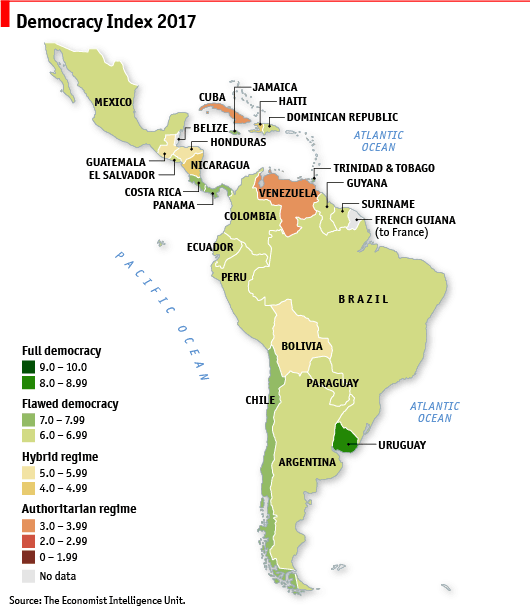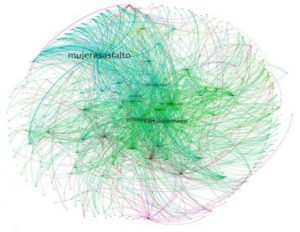
Credit: EIU
Corruption was the major story for Latin America’s democracies this year, according to The Economist Intelligence Unit’s Democracy Index:
Although scores declined for the region as a whole, there is some cause for optimism. Although there were shortcomings in elections in Nicaragua and Honduras—and elections can be expected to be neither free nor fair in Venezuela this year—Latin America will host six other elections this year that should be both free and fair. As the regional drive against corruption proceeds, countries should be able to “clean house” and deter future corruption. What will require work is the ongoing consolidation of democracy, particularly in building political culture and improving good governance to build popular support for democracy. Until this is done, Latin America is unlikely to record any major improvements in its position.
 But Latin America is also a hotbed of political innovation, according to Caio Tendolili, an economist who works in political experimentation at UPDATE.
But Latin America is also a hotbed of political innovation, according to Caio Tendolili, an economist who works in political experimentation at UPDATE.
- First, citizens have taken it upon themselves to push for social change, he writes for Open Democracy. From protests such as the Secundarista Movement in Brazil, where students pushed for educational reforms in São Paulo’s public high schools (the movement later spread across Brazil), to #YoSoy132 in México, in which students protested political corruption during the 2012 presidential election), citizens are developing innovative ways to mobilize resources and pressure elected officials and bureaucrats in order to pursue public policy changes.
- Second, political activists are discovering new and better ways to explain complicated public policy to their fellow citizens. From the Latin American feminist movements demanding reproductive rights and bringing attention to the issue of domestic violence—#PrimaveraFeminista, #NiUnaMenos—to Pimp My Carroça, a Brazilian organization that uses street art to raise the profile of those who collect recyclable materials, and GregNews, a comedy news show (basically Last Week Tonight with John Oliver in Brazil), activists and organizations are using social media and humor to bring citizens closer to public interest issues.
- Third, elected officials are making an effort to make institutions more participatory and inclusive. Efforts ranging from DemocracyOS (Argentina) and LinQ (Ecuador) to Brazil’s Internet Bill of Rights and the Nariño state government’s GANA (Colombia) have made great strides in mobilizing people and giving them a voice in the policymaking process……
- Fourth, civil society organizations are combining open data and technology to monitor and hold politicians and corporations accountable. Groups like Paraguay’s A Quienes Elegimos, Argentina’s Chequeado, and Chile’s Del Dicho al Hecho using well-developed online tools and well-organized public protests to insist on transparency from even their own supporters in government.
- And finally, there’s a recognition that politics across Latin America needs new voices and new people to get involved. Today, movements such as Mexico’s WikiPolítica and Brazil’s Bancada Ativista, as well as new political parties like Chile’s Revolución Democrática and Argentina’s Partido de la Red, are working to make politics accessible, cool, and honorable to a new generation of activists.







